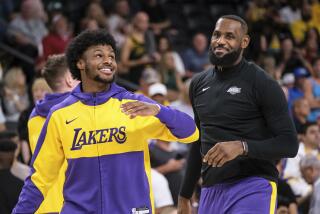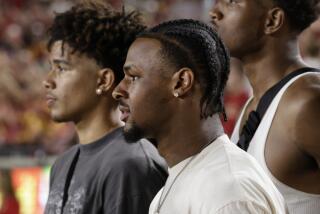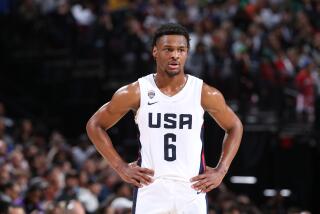Rhett Makes the Call to End Playing Career : College basketball: Doctors tell South Carolina standout that his condition is treatable, but he decides against taking any more chances.
- Share via
When all the tests were in and the doctors and University of South Carolina officials were finished with their meetings, the decision of whether Joe Rhett would return to the basketball court was all his. And he chose not to play.
Tuesday, doctors told the 21-year-old Rhett, who has been playing the past two seasons with a pacemaker to regulate a slow heartbeat, that he also had another heart condition, a sometimes rapid heartbeat that might have caused his fainting spell 11 days ago while he was playing in a game against Mississippi State.
They told him that the condition--called atrial fibrillation--is a rapid heartbeat brought on during rigorous exercise because the accessory chambers of his heart don’t pump rhythmically, causing the heart to flutter. It is a minor arrhythmia, unlikely to cause sudden death, they said, but it could cause him to have blackouts during exercise.
Doctors also told Rhett that it is a treatable condition, perhaps even temporary, but they need more tests.
Hakeem Olajuwon of the Houston Rockets has been treated on medication for the same condition, discovered about six months ago.
But Olajuwon is already a star. What doctors didn’t have to tell Rhett was that his dream of getting drafted by an NBA team was over. Rhett was his team’s leading scorer and rebounder, averaging 16.8 points and nine rebounds a game. It was his best year by far.
Monday night, Rhett said he had been dreaming of an NBA career his entire life. Tuesday, after doctors laid out the facts for him, his dream was put in perspective.
“My health is more important than playing basketball,” Rhett said at a news conference in Columbia, S.C. And then Rhett boarded a bus with the team for the trip to Oxford, Miss., where he will act in a capacity of student-coach for tonight’s game against Mississippi and for the remainder of the Gamecocks’ season.
Rhett’s mother, Mary, reaffirmed that the decision not to play was her son’s, not the school or the doctors. Had Rhett decided to play, it is unknown what the school might have done, a university spokesman said.
“I am disappointed for my son, but this is not a life-or-death situation,” Mary Rhett said from her home in Columbia. “This is not like Hank Gathers’ heart condition. Joe has a rapid heartbeat in the upper chamber that has to do with when he gets highly active. It can be corrected with medication, or it may be temporary, caused by his low blood pressure. They just need some time to observe him and test him.
“But this is not the end. Joe could go back out and play.”
Gathers collapsed March 4, 1990, while playing in a postseason game and died within two hours of an unknown heart muscle inflammation, with scar tissue. His condition was diagnosed four months earlier as ventricular arrhythmia--a very rapid heartbeat--after he fainted while playing in a basketball game. He was treated with the medication, Inderal, which slows the heart rate.
Both Rhett’s and Gathers’ arrhythmias occur during rigorous exercise, but they differ greatly. Doctors say that during atrial fibrillation the heart loses about 10% of its function, but still pumps. But during ventricular fibrillation the heart quits pumping.
“You don’t need the upper chambers--the atria--functioning, because all they do is add about 10 or 15% to the amount of blood that goes into the ventricle,” said Dr. John Criley, medical director of St. John’s Heart Institute and Professor of Medicine and Radiological Sciences at the UCLA School of Medicine. “Without the upper chambers, the ventricles still fill and pump. But if the ventricles fibrillate (quiver), the valve between the left ventricle and the aorta doesn’t even open and there is no forward flow of blood unless CPR or defibrillation occur.”
Still, Rhett’s physicians aren’t taking any chances. Bill McKenzie, the university’s physician, said it was highly unlikely that Rhett could die playing basketball from the arrhythmia, “but the fact that we can’t state unequivocally that no, it won’t occur, is our biggest concern,” he said at the news conference.
Since he fainted, Jan. 25, Rhett said he has tried to keep a positive outlook. It wasn’t that long ago that Rhett went through the same rigorous medical testing, the same anxiety and uncertainty.
Two years ago, Rhett was in a motel room, waiting for the team bus to leave for a game when he felt dizzy and thought he was going to faint. Tests revealed a slow heartbeat. At times, his heart even stopped beating for eight-to-10-second intervals, usually when he was in bed at night, but always when he was at rest.
So at 19 years old, Rhett had a pacemaker installed. Two weeks later, Gathers collapsed and died. The news of Gathers’ sudden death scared Rhett, but he was convinced by doctors that his condition was different. So he played.
Then 11 days ago, the day Oregon State player Earnest Killum was buried after suffering a stroke, Rhett fainted while playing in the second half of South Carolina’s game against Mississippi State. He stopped playing, told his teammates he didn’t feel well, and before trainers could help him off the court, he fainted. He was taken to Richland Memorial Hospital in Columbia, where tests determined Rhett had fainted from dehydration and fatigue, with no evidence of a pacemaker malfunction or damage to his heart.
Rhett said in an interview Monday night from his dormitory room in South Carolina that Gathers’ death seemed to complicate the legal aspects of him returning to play at South Carolina. He said there were so many legalities that he didn’t get to take part in the preseason conditioning for last season, and says that is the reason he didn’t perform as well last year.
“The timing isn’t that good,” Rhett said of his medical problems, “but I don’t blame the university. This is the second time for me, and I can see why they are being careful.”
Rhett, a 6-foot-8 forward, was being scouted by NBA teams, but is not considered to be a bona fide NBA prospect. Still, NBA scout Marty Blake said before Rhett’s latest test results that Rhett has a chance for an NBA career. Blake said if Rhett wasn’t drafted, some teams may invite him to try out. “He’s a prospect, one of maybe 100 at the college level,” Blake said. Rhett ends his college career with 1,142 points for an 11.3 average, and 678 rebounds, a 6.7 average.
More to Read
Go beyond the scoreboard
Get the latest on L.A.'s teams in the daily Sports Report newsletter.
You may occasionally receive promotional content from the Los Angeles Times.










